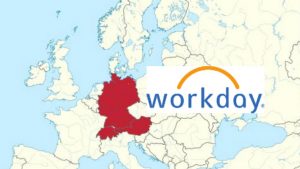
Workday in DACH
ET asked Richter how Workday is doing in the DACH region?

“We have been proactive in the DACH region for about five years and have offices in six locations, Vienna, and Zurich, then Munich, Hamburg, Frankfurt and Berlin. We have a number of large customers with many headquartered in DACH such as Deutsche Bank, Siemens, Software AG, Scout 24, and so on. There is a larger set of smaller start-ups tech and financial companies. We have a good position in the market at the moment, and the business is going well.”
What Workday products, Finance, HCM, Analytics, Planning, Procurement and PSA, is it selling in Germany?
“Procurement is fairly new, so that is evolving. Workday, Prism Analytics and Adaptive Insights are very much part of our offering, and we’re also signing customers here. More and more often, we see platform deals where we see all four solutions together. “(HCM, Finance, Analytics and Planning).”
“Some of our customers are using Workday PSA. On payroll, our strategy is to continue providing connection options with the payroll providers favoured by our customers in the region. This includes the most common providers in the German market, such as P&I Loga, SD Worx and Sage – and also our network of certified payroll partners.”
It is fair to say that Workday is not selling PSA actively in the DACH region. It does not appear at all on its German-language website. Enterprise Times has asked Workday to provide some more details around PSA across Europe as a whole, but in the last year, it has been unable to provide a customer to talk to about their implementation.
On growth
Can you share any numbers such as customers and revenues
“Revenue, we don’t (share) for the region. We have about 400 global and local customers in Austria, and about 1000 in Germany. We have 20% of the DAX 30 as customers.
What about the balance between HCM and Finance?
“We are making already a significant part of our revenue in the DACH region out of financials. This is good for us because we only started to proactively position financials in DACH last year. An important part is that we already have partner resources for financials in Germany, Austria and Switzerland.”
The future
What do you hope to achieve in 2020?
“We want to keep the growth on the HCM side, and we have a couple of big names there, I can’t tell you what they are. But I hope by the end of the year to have a few more DAX companies using Workday. The second area is the growth that we’re doing in financials, that is not as well-known as it should be. The big thing that we’re working on at the moment is demonstrating the business value of unified HCM and financials.
“Together with some other cloud companies like ServiceNow or Salesforce, we are in a position to win in several industries to replace an SAP landscape. It’s relevant because some customers are not willing to make the switch to S/4HANA. With Workday, we can take them in a different direction with a modern cloud architecture instead of continuing with SAP. It is a discussion we are having with many customers at the moment, which is interesting.”
When you say many customers is that in the services verticals?
“We have a variety of customers, but we’ve had a lot of success on the services side, particularly with technology and media organisations. “
On COVID-19
Are you feeling any impact of COVID-19 from a business point of view?
“I’ve just jumped out of a customer workshop that was supposed to be on-site, and which is now online. I’m surprised how much it continues the way it was planned to be. In the industries that are not heavily affected by the Coronavirus, we almost see ‘business as usual’ in a way that is not usual because it’s all virtual. It takes a little bit to change the way of working, but not a change of strategy nor the change of their plans or even the timelines. There are other industries which are hard hit like travel, transport and tourism.”
Workday has also made several commitments relating to the safety customers, employees, partners and visitors. This includes donations to charities and additional support for employees through the crisis and beyond.
Competing against SAP
What are the three key differentiators when you are competing against SAP?
“First and foremost, and I always use this with customers when we are in an RFP process. I say ‘take a tenant of Workday, give it to your employees ask them to do five things that they do without teaching them anything. Put in a vacation request; look at your payslip or whatever. Do the same thing with your HR team, take five people let them work without any training on Workday. Then do the same thing with SuccessFactors. I guarantee you there will be a huge difference in how people see and are comfortable with the system. They open Workday and they intuitively know what to do and where to go. This is one key benefit for the users. The system is so modern and designed in a way, so it’s very similar to a YouTube or Netflix environment. You can intuitively operate it without training.
“Secondly, we have a philosophy at Workday that if we deliver a solution, which usually goes relatively fast compared our competition, because of the core architecture, that the customer is able to work with the system. If, for example, you change the process like a vacation, then the HR department can do this by itself. You do not need, like with the other solutions, permanent consultants who create reports and change something in your system to change the process. If you speak to customers who have SuccessFactors, they will tell you to spend a lot of money after the implementation to constantly have things changed in the system. Our philosophy is completely different here. In the implementation cycle, there is a big chunk of training and enablement, and typically our customers can operate the system when they are live. They don’t need Workday or a consultant anymore.
“Third, it’s important to mention, and I really like this coming from SAP to Workday, is that we have one code line. We call it the Power of One. We have one security system, one code line.”
Rudi explained that acquisitions such as Scout RFP and Adaptive Insights would come into that single code line. There is now a version of Adaptive running in the code line. The Workday strategy is to ensure that all acquisitions will run similarly in time.
On SAP in Germany
There is a degree of loyalty within Germany, especially to SAP. How do you overcome that?
“I do not think there is loyalty to SAP because it’s a German company at all. It has a minimal effect. It is their home market. They have been there for 40 years. They are dominant there’s no question about that. But I think people are judging their solutions and where they are spending their money and the value that it delivers to them.”
How does this competition evolve in 2020?
“I don’t think it’s going to get less. We have SAP and Oracle to some extent in the market. The competition will be as fierce as it has always been.
“What we will keep doing is to focus on our core values that we have with our solution. We will focus on people, where we also put a lot of focus on internally is on our workforce. As our boss says, he doesn’t think that you can have happy customers without happy employees. “
If Workday retains its values amongst its employees, Richter is confident that this will, in turn, win new customers.
On growth and challenges
Where are you looking for growth? What industries?
“The mid-market. The Mittelstand was a growth engine for us last year. It was the best performing part. That’s an area where we’re really making a lot of progress. The second area of focus is the big DAX companies, maybe not all of them. There are some significant ones who are really big for us. The third area of focus is the Fintech companies. There’s also some start-ups in the Berlin area, which are looking for modern HR solutions like Workday.”
Will the recent HCM acquisitions such as Ultimate and Cornerstone have an impact in DACH?
“Not as much. To be fair, what we’re seeing is 90% of our teams compete against SAP. Yes, there is Cornerstone and Oracle, but the main interest on our side is whatever SAP is doing.”
What are your challenges ahead in 2020?
“Well, the one challenge that we all have is coming out of this crisis. We are a company that is used to working virtually. But not all of our customers are. We’ve noticed this in the last couple of days that people don’t have webcams at home and they have multiple connections at home when we’re trying to engage with them. One challenge will be to get back to normality which will take some time. It’s not something that anyone foresaw a few weeks back. Another challenge is that we’re growing significantly in terms of people in the DACH region. Finding talent is really a challenge. We have several open positions, and we’re looking for good people.”
Enterprise Times: What does this mean
Richter shared some interesting insights into the DACH market. He is looking to further expand the presence of Workday in the DACH region, mainly at the expense of SAP. While at first glance, this is likely to be in the service industries, in combination with Salesforce and Rootstock ERP, it may also touch some manufacturing companies, especially in the Mittelstand.
With regards to COVID-19, the situation is so fluid at the moment that answers to that question are likely to change as the impact worsens. Germany, while initially seeming to escape some of the worst now has an increasing death rate which is likely to impact business in the coming weeks. The longer the lockdown situation continues, the worse the impact as well. Some companies may take some time to return to normality after this is over.


























